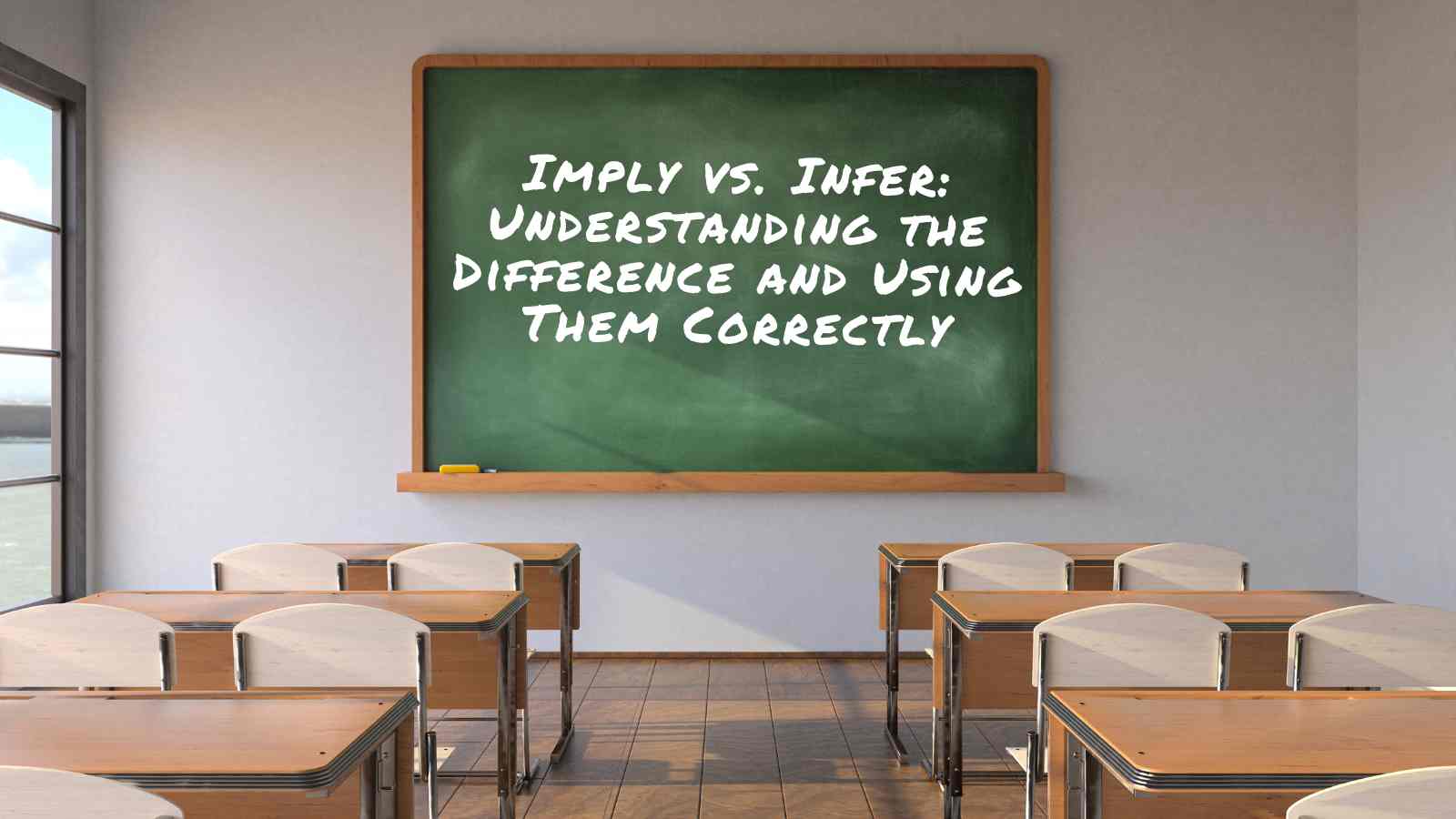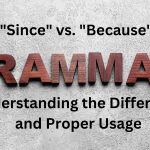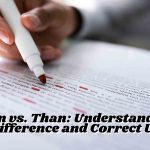
Imply vs. Infer: Understanding the Difference and Using Them Correctly
Imply and infer are two words that are often confused and misused in the English language. While they may seem similar, they have distinct meanings and are used in different contexts. Understanding the difference between these two words is crucial for effective communication and writing.
To imply means to suggest or indicate something indirectly, without explicitly stating it. The speaker or writer is responsible for implying, as they are the one making the suggestion. For example, “The dark clouds imply that it might rain soon.” In this case, the presence of dark clouds suggests the possibility of rain, but it is not directly stated.
On the other hand, to infer means to draw a conclusion based on evidence or reasoning. The listener or reader is responsible for inferring, as they are the one making the deduction. For example, “Based on the dark clouds, I infer that it might rain soon.” In this case, the speaker is drawing a conclusion about the likelihood of rain based on their observation of the dark clouds.
One way to remember the difference is to think of the speaker “implying” and the listener “inferring.” The speaker implies, and the listener infers based on what the speaker has implied.
It’s important to use these words correctly to avoid confusion and miscommunication. When you want to suggest something indirectly, use “imply.” When you want to draw a conclusion based on evidence or reasoning, use “infer.”
Here are a few more examples to illustrate the difference:
- Imply: “The manager’s tone implied that he was not happy with the team’s performance.” Infer: “From the manager’s tone, the team inferred that he was not satisfied with their work.”
- Imply: “The politician’s statement implied that there would be tax cuts in the future.” Infer: “Based on the politician’s statement, the public inferred that tax cuts were on the horizon.”
- Imply: “The teacher’s feedback implied that the student needed to improve their essay structure.” Infer: “From the teacher’s feedback, the student inferred that they should focus on improving their essay structure.”
In conclusion, understanding the difference between imply and infer is essential for clear communication. Remember that implying is done by the speaker or writer, while inferring is done by the listener or reader. By using these words correctly, you can express your ideas more effectively and avoid misunderstandings.
Etymologies
The words “imply” and “infer” have interesting etymologies that can help us better understand their meanings and how they came to be used in the English language.
Imply: The word “imply” comes from the Old French “emplier,” which meant “to enfold” or “to entangle.” This, in turn, originated from the Latin “implicare,” which meant “to enfold” or “to involve.” The Latin word is a combination of the prefix “in-” (meaning “in” or “into”) and the verb “plicare” (meaning “to fold” or “to twist”).
Over time, the meaning of “imply” shifted from a literal sense of folding or entangling to a more figurative sense of suggesting or indicating something indirectly. This shift in meaning is similar to the idea of folding or hiding something within a larger context.
Infer: The word “infer” comes from the Latin “inferre,” which meant “to bring in” or “to conclude.” This Latin word is a combination of the prefix “in-” (meaning “in” or “into”) and the verb “ferre” (meaning “to carry” or “to bear”).
The meaning of “infer” has remained relatively stable over time, consistently referring to the act of drawing a conclusion based on evidence or reasoning. The idea of “bringing in” or “concluding” something based on available information is central to the concept of inferring.
It’s interesting to note that while “imply” and “infer” are often confused, their etymologies highlight the distinct roles of the speaker (who implies or enfolds a suggestion) and the listener (who infers or brings in a conclusion based on the available evidence).
Understanding the origins and historical meanings of these words can help us use them more accurately and effectively in our communication.
Imply or Infer Practice Questions
Here are the 20 practice questions with blanks to fill in with “imply” or “infer”:
- When the boss said, “I need that report by the end of the day,” what did she _____?
- Based on the student’s nervousness and lack of eye contact, what can we _____ about his preparation for the presentation?
- The politician’s statement, “We will explore all options to improve the economy,” _____ what about the current economic situation?
- If a person buys a large suitcase and a travel guide, what can you _____ about their plans?
- The doctor’s tone _____ what about the patient’s condition?
- From the data presented in the graph, what can we _____ about the company’s sales performance over the past year?
- When the weather forecast mentions a “chance of precipitation,” what does it _____ about the likelihood of rain or snow?
- If a person consistently arrives late to work, what can their employer _____ about their attitude towards punctuality?
- The author’s description of the character’s actions _____ what about their personality?
- When a teacher spends extra time reviewing a concept, what can students _____ about its importance?
- If a company’s stock price suddenly drops, what might this _____ about investors’ confidence in the company?
- Based on the evidence presented in the trial, what did the lawyer want the jury to _____ about the defendant’s innocence?
- When a friend says, “I’m fine,” but their tone and body language suggest otherwise, what can you _____ about their emotional state?
- The presence of dark clouds and strong winds _____ what about the upcoming weather?
- If a restaurant has a long line and a waiting list, what can you _____ about its popularity and quality of food?
- When a person consistently cancels plans at the last minute, what might this _____ about their reliability?
- Based on the tone and content of the email, what can the recipient _____ about the sender’s feelings towards the project?
- If a city experiences a population boom and rising housing prices, what can we _____ about its economic growth and desirability?
- The manager’s decision to implement a new training program _____ what about their view on employee development?
- When a person avoids eye contact and gives short, evasive answers, what might you _____ about their level of honesty or comfort in the conversation?
Lesson Plan: Understanding and Using Imply and Infer
Objective: Students will understand the difference between “imply” and “infer” and be able to use these words correctly in context.
Duration: 60 minutes
Materials:
- Whiteboard and markers
- Handouts with examples and practice questions
- Writing materials for students
Introduction (10 minutes):
- Begin by asking students if they know the meaning of “imply” and “infer.”
- Write the words “imply” and “infer” on the whiteboard and discuss their etymologies briefly.
- Explain the main difference between the two words: “imply” is used when a speaker or writer suggests something indirectly, while “infer” is used when a listener or reader draws a conclusion based on evidence or reasoning.
Direct Instruction (15 minutes):
- Provide examples of how “imply” and “infer” are used in sentences. Write these examples on the whiteboard.
- Example for “imply”: The dark clouds imply that it might rain soon.
- Example for “infer”: Based on the dark clouds, I infer that it might rain soon.
- Explain that the speaker “implies” and the listener “infers.”
- Discuss the importance of using these words correctly to avoid confusion and miscommunication.
Guided Practice (15 minutes):
- Divide the class into small groups.
- Provide each group with a handout containing a mix of sentences using “imply” and “infer.”
- Ask the groups to discuss and determine whether each sentence uses “imply” or “infer” correctly.
- Review the answers with the entire class and clarify any questions or misunderstandings.
Independent Practice (15 minutes):
- Provide each student with a handout containing fill-in-the-blank questions (like the ones provided earlier).
- Ask students to complete the questions independently.
- Review the answers with the class and provide explanations for each correct answer.
Closure (5 minutes):
- Recap the main points of the lesson: the difference between “imply” and “infer,” and the importance of using them correctly.
- Encourage students to use these words correctly in their own writing and speaking.
Assessment:
- Observe student participation and understanding during the guided practice.
- Review and grade the independent practice handouts to assess individual understanding.
Extension:
- Ask students to write a short paragraph using “imply” and “infer” correctly in context.
- Provide additional examples or practice questions for students who need more support.
- 100 Screenwriting Ideas to Get You Writing - January 20, 2026
- 100 Winter Storm Writing Prompts - January 17, 2026
- 100 Haunted House Story Starters: Craft Your Scariest Tale Yet - January 10, 2026



